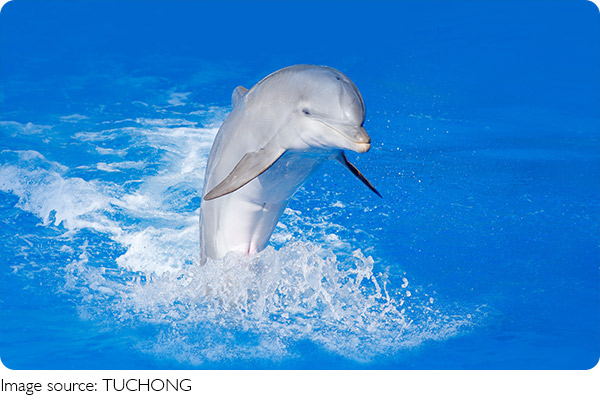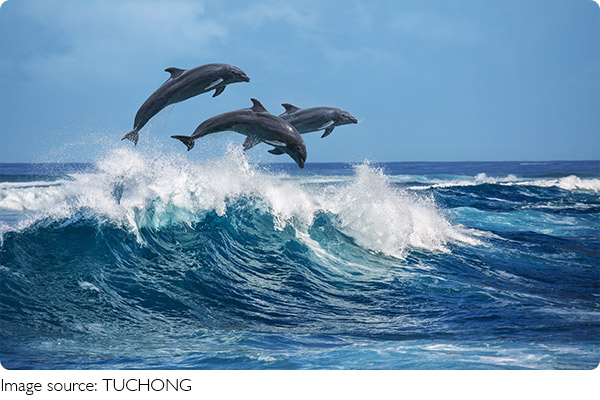Friendly Dolphins

When we think of dolphins, we often imagine playful creatures jumping through the waves, their sleek bodies cutting through the water with grace. But dolphins are much more than just adorable sea animals.
These marine mammals have a rich social life, sophisticated communication skills, and incredible intelligence. In this article, we'll dive into the fascinating world of dolphins, exploring their behaviors, social structure, and what makes them so unique.
Incredible Dolphin Moments | BBC Earth
Video by BBC Earth
What Makes Dolphins So Smart?
Dolphins are considered one of the most intelligent animals on the planet. In fact, their intelligence is often compared to that of great apes like chimpanzees. One of the key factors behind their smarts is their large brain. Dolphins have a high brain-to-body ratio, meaning their brains are relatively large compared to their body size.
What's even more impressive is that dolphins are known to solve complex problems. They can use tools, understand symbolic language, and even recognize themselves in mirrors, which is a sign of self-awareness. Dolphins also have the ability to learn new behaviors from each other, which shows their capacity for cultural transmission—an ability that not many species possess.
Dolphin Communication: More Than Just Sounds
When we hear dolphins communicate, we usually think of their high-pitched whistles and clicks. But their communication is far more complex than it appears. Dolphins use a range of sounds to convey messages, and each dolphin has its own unique whistle, almost like a name. These whistles allow them to call each other, coordinate group activities, and even express emotions.
Interestingly, dolphins can also use body language to communicate. For example, they may slap the water with their tails to signal danger or use specific postures to indicate aggression or friendliness. This mix of vocalizations and body movements helps them maintain strong social bonds and navigate their daily lives.

The Social Lives of Dolphins
Dolphins are highly social animals that live in groups known as pods. These pods can range from just a few individuals to several hundred. The social structure within these pods is intricate and can vary depending on the species of dolphin. Some dolphins form long-lasting friendships, while others might have more fluid social relationships.
In a pod, dolphins work together to hunt for food, protect each other from predators, and even care for injured or sick members. This teamwork is one of the reasons why dolphins are so successful in the wild. They're not just living in isolation—they're part of a tight-knit community that relies on cooperation and mutual support.
The Importance of Play for Dolphins
You might have seen videos of dolphins playing with each other, tossing seaweed around or riding the waves next to boats. This playful behavior is not just for fun—it plays an important role in their social development. Play helps young dolphins learn critical skills they will need as adults, such as hunting, communication, and socializing.
But even adult dolphins engage in play. Some studies suggest that playing may also help dolphins form social bonds and reduce stress. It's clear that for dolphins, playtime is an essential part of their lives, allowing them to stay connected and maintain their well-being.
How Dolphins Interact with Humans
Humans and dolphins have a long history of interaction. Dolphins are often seen in marine parks, where they perform for audiences, and they have even been trained to assist in tasks like rescuing people at sea. There are also instances where dolphins have helped humans in the wild, guiding lost swimmers to safety or protecting them from sharks.
While these interactions can be awe-inspiring, it's important to remember that dolphins are wild animals. They may be friendly and curious, but they should always be treated with respect and care. Many conservationists emphasize the importance of protecting their natural habitats and ensuring that humans don't exploit these incredible animals.

Conclusion: Why We Should Protect Dolphins?
Dolphins are much more than just beautiful creatures of the sea. They are intelligent, social, and playful animals that deserve our respect and protection. As we continue to learn more about these fascinating animals, it's crucial that we do everything we can to ensure their survival in the wild.
By supporting conservation efforts and respecting dolphins' natural behaviors, we can help preserve these remarkable creatures for generations to come. So, next time you see a dolphin leaping through the water, take a moment to appreciate all that they are—and remember that we all play a part in protecting the world around us, including the amazing dolphins who call the ocean home.
Lykkers, now that you know more about dolphins, don't you think they're even more fascinating than you imagined? They truly are wonders of the sea! Let's work together to protect them and their habitats.


